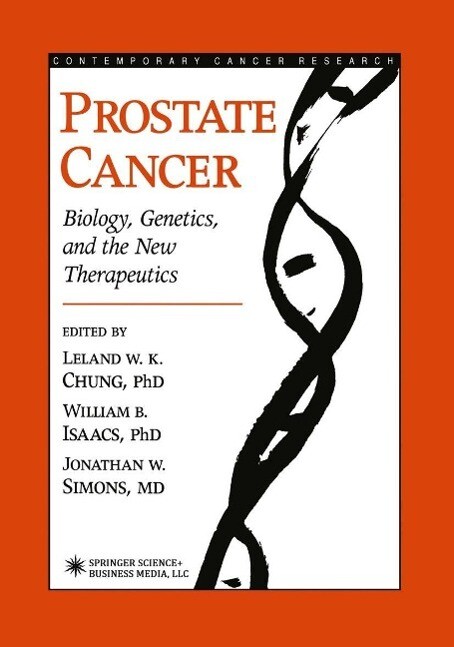
Sofort lieferbar (Download)
Progress in sequencing and characterizing the human genome has transformed cancer genetics both conceptually and methodologically. In Prostate Cancer: Biology, Genetics, and the New Therapeutics, leading cancer biologists and clinical researchers comprehensively review the latest basic research and its translational significance for the molecular biology and genetics of prostate cancer, as well as its application in developing novel therapeutics. Highlights of recent molecular genetics research include new light on inactivated tumor suppressor genes, HPC families, the role of the androgen receptor, the progression of prostate cancer, and promising results from transcriptome profiling and proteomics. Research into the basic biology and regulatory mechanisms controlling prostate cancer growth, progression, and stromal-epithelial interaction has revealed many new possibilities for therapeutic intervention, including cell adhesion molecules, the androgen receptor, use of the nuclear matrix, Caveolin-1, and the prostate-specific membrane antigen. Among the cancer therapeutic modalities discussed are chemoprevention, radiotherapy, radical retropubic prostatectomy, the development of dendritic-cell based vaccines, differentiation therapies, and gene therapy.
Comprehensive and cutting-edge, Prostate Cancer: Biology, Genetics, and the New Therapeutics synthesizes all the major recent work that is not only rapidly unraveling the mysteries of prostate cancer, but also dramatically improving today's therapeutic approaches.
Comprehensive and cutting-edge, Prostate Cancer: Biology, Genetics, and the New Therapeutics synthesizes all the major recent work that is not only rapidly unraveling the mysteries of prostate cancer, but also dramatically improving today's therapeutic approaches.
Inhaltsverzeichnis
I. Introduction.- 1 Building the Road to Defeat Prostate Cancer: A Dedication to Donald S. Coffey.- II. Cancer Genetics.- 2 Hereditary Prostate Cancer.- 3 AR Gene Alterations in Prostate Cancer Progression.- 4 Lethal Metastatic Human Prostate Cancer: Autopsy Studies and Characteristics of Metastases.- 5 Tumor Suppressor Genes in Prostate Cancer.- 6 Androgen Receptor Polymorphisms and Prostate Cancer Risk.- 7 The Genetic Epidemiology of Prostate Cancer: Closing in on a Complex Disease.- 8 Determination of Gene and Chromosome Dosage in Prostatic Intraepithelial Neoplasia and Prostatic Carcinoma by Molecular Cytogenetic Techniques.- 9 Genetic Alterations in Prostatic Intraepithelial Neoplasia (PIN).- 10 Xenograft Models and the Molecular Biology of Human Prostate Cancer.- 11 Comprehensive Analyses of Prostate Gene Expression.- III. Cancer Biology.- 12 The Role of Nuclear Matrix and Cytoskeleton in Cancer.- 13 The Role of Cell Adhesion Molecules in Prostate Development and Carcinogenesis.- 14 Ligand Dependent and Independent Activation of the Androgen Receptor.- 15 Tyrosine Kinases and Cellular Signaling in Prostate Cancer.- 16 Molecular Pathways Underlying Prostate Cancer Progression: The Role of Caveolin-1.- 17 Angiogenesis and Prostate Cancer.- 18 Prostate Specific Membrane Antigen.- 19 Targeting Antiapoptotic Genes Upregulated by Androgen Withdrawal Using Antisense Oligodeoxynucleotides to Enhance Androgen- and Chemo-Sensitivity in Prostate Cancer.- 20 Stromal-Epithelial Interaction: From Bench to Bedside.- IV. Cancer Therapeutics.- 21 Chemoprevention of Prostate Cancer.- 22 Anatomic Radical Retropubic Prostatectomy for Prostate Cancer.- 23 Radiation Therapy as Applied to Prostate Cancer: Clinical, Technical, and Biologic Considerations.- 24 Prostate Cancer Chemotherapy: Closing Out a Century and Opening a New One.- 25 The Role of Small Bioactive Peptides and Cell Surface Peptidases in Androgen Independent Prostate Cancer.- 26 Development of Dendritic Cell-Based Prostate Cancer Vaccine.- 27 Antiprogression Agents for Prostate Cancer.- 28 Human Gene Therapy for Urological Oncology.- 29 Chemoprevention Trials for Prostate Cancer.
Produktdetails
Erscheinungsdatum
15. Dezember 2000
Sprache
englisch
Auflage
2001
Seitenanzahl
531
Dateigröße
79,62 MB
Reihe
Contemporary Cancer Research
Herausgegeben von
Leland W. K. Chung
Verlag/Hersteller
Kopierschutz
mit Wasserzeichen versehen
Produktart
EBOOK
Dateiformat
PDF
ISBN
9781592590094
Entdecken Sie mehr
Pressestimmen
"...the editors have done a remarkable job in selecting the topics and compiling the various articles into a comprehensive and easily accessible volume. The chapters are concise and informative, covering highly innovative studies being conducted in the field of recent years...the complexity of prostate cancer biology is well represented in the book, and the resourceful information can benefit not only those who are interested in prostate biology, but also those researchers employing molecular and cellular approaches to solve other important biological questions." - Quarterly Review of Biology
"...a welcome addition to the literature...The main strength of this book is that experts from several disciplines have contributed their thoughts on recent advances in prostate cancer...I strongly recommend this book to researchers who study prostate cancer, whether at the bench or at the bedside, and to clinicians who treat patients with prostate cancer... the book covers our current knowledge of prostate cancer and its treatment and helps define the foundation for future directions." - New England Journal of Medicine
"Well researched and extensively referenced, the book provides a valuable source of information on the current state of understanding of the molecular biology of prostate cancer, and the treatment modalities in routine clinical practice." - ACP News
"Each chapter is presented in a way that provides all available knowledge on the subject and the book structure allows readers to use a single section or chapter according to their interests. All these characteristics make the book a valuable tool to general oncologists or urologists interested in updating their basic knowledge of prostate cancer." -Annals of Oncology
Bewertungen
0 Bewertungen
Es wurden noch keine Bewertungen abgegeben. Schreiben Sie die erste Bewertung zu "Prostate Cancer" und helfen Sie damit anderen bei der Kaufentscheidung.










